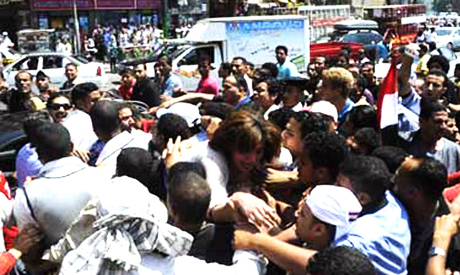NOVANEWS

Egypt’s prosecutor-general has launched an investigation into incidents of mass sexual assault – including a video of an alleged mob attack on a woman – that took place in Tahrir Square on Sunday night in celebrations to mark the inauguration of newly-elected President Abdel-Fattah El-Sisi.
The prosecution is currently interrogating a number of suspected harassers who were arrested by security forces on Sunday night, Al-Ahram’s Arabic news website reported on Monday.
The interior ministry announced on its Facebook page that it has arrested seven suspects accused of sexual harassment. The news is considered one of the first incidents of police arresting alleged sexual harassers in the square on the same day as the assault.
Several accounts of sexual harassment in the iconic square were reported on Sunday night across Egyptian news websites and privately-owned satellite channels like Tahrir TV and Al-Hayat TV.
The square was eventually closed off by security forces in the early hours of Monday morning, with all citizens evacuated, due to what private media reports said was both the sexual assault cases and fights between street vendors.
Video: mob sexual assault
By Sunday night around 10pm, a video began circulating on social media sites of an alleged mass sexual attack on a woman in the square. The news was soon picked up by Masrawy news website, which said that the incident took place in Tahrir Square during the El-Sisi celebrations and that the victim was eventually rescued by security forces.
The victim has since been transferred to nearby Al-Helal Hospital and is in critical condition, according to a security source at Cairo’s security directorate, speaking with Masrawy.
The security source told Masrawy that police had arrested two men who had allegedly participated in sexually assaulting and raping the woman.
The woman’s rape cannot be verified. The video clip shows a naked woman with visible bruises on her back encircled by a group of men, including a policeman, who escort her to a nearby ambulance.
The date of the video, which does not show the victim’s face, has not been yet verified – some say that it was shot on Saturday during other El-Sisi celebrations and then uploaded on Sunday. Others claim that it is old footage from 2012.
An informed source told the Reuters’ affiliated Aswat Masriya website that the video was authentic, meaning that it had taken place, but did not specify the time. The source also confirmed that the prosecutor-general has begun an investigation into the incident, demanding all CCTV videos from Tahrir as well as a list of the names of the officers and soldiers assigned to secure the square.
According to Aswat Masriya, the El-Nadeem Centre for the Management and Rehabilitation of Victims of Violence – an Egyptian NGO – is currently following the case and has confirmed that the prosecutor-general’s office is also investigating incidents of mass harassment that took place on Saturday as well.
‘Shameful behaviour’
The National Council for Women (NCW) condemned the incident and in a statement released on Monday accused the assailants of trying to “spoil” and defame Sunday night’s “democratic festivities” in front of the whole world.
“That shameful behaviour is not the behaviour of the millions who led the 25 January and 30 June revolutions, where millions occupied Egypt’s square with no single recorded sexual harassment incident,” the NCW statement said.
While the statement’s anger is likely to reverberate, its claim that no sexual harassment took place in Tahrir Square during the 2011 and 2013 uprisings is unfounded.
Incidents of mob sexual assaults have become enough of a problem during protests in Tahrir over the last three years that activists have formed anti-harassment groups to confront the endemic behaviour.
Around 46 accounts of sexual assault in Cairo were reported by Operation Anti-Sexual Harassment during the 30 June 2013 protests that led to the ouster of president Mohamed Morsi.
Women’s rights activists have called for an anti-sexual assault protest in Tahrir Square on Friday, 20 June.
But sexual harassment has also been a growing problem outside of Tahrir Square and protests in the last decade.
More than 99 percent of women surveyed across 27 governorates said they’d experienced some form of harassment, from minor incidents to rape, according to a 2013 report by the United Nations and Egypt’s Demographic Centre and the National Planning Institute.
Last week, former interim president Adly Mansour issued a sexual harassment law that activists praised for stipulating tougher penalties and jail terms for offenders.
However, activists still expressed hope that the law will be enforced in public and lead to more sexual harassment cases being successfully prosecuted.



